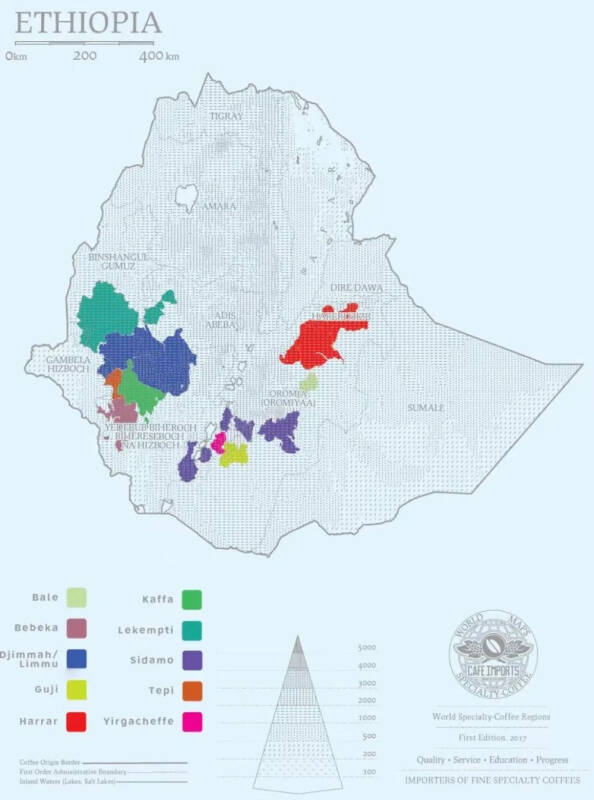Do you know how the Ethiopian drink coffee?

Ethiopia, as the country of origin of coffee, believes that it is a sacred place that countless friends think of day and night. Yejaschenne, Guji and Sidamo are all well-known coffee producing areas in Ethiopia, and their coffee flavors are very unique and well-loved by everyone.

So I wonder if you have ever understood how people in the places that produce these delicious coffees make coffee.
If you go to Addis Ababa, the capital of Ethiopia, there will be two very different cafes: one is influenced by the coffee culture brought about by the Italian occupation during World War II. Espresso-based cafes opened in prosperous urban areas In Ethiopia, there are more cafes of the second kind, which can be seen all over the streets of Egypt.
It is not so much a coffee shop as a coffee stand, because this kind of shop is very simple. Although it is easy, these coffee stalls sell the Ethiopian tradition, the coffee brewing method that the Ethiopian people have continued for thousands of years! The stall is filled with large and small cups and cans, including Jebena with African ceramic colors, and several earless ceramic cups, which are important instruments that make up the Ethiopian tradition. In addition to clay pots and earless cups, they will also be equipped with stoves, pans, and pestles and mortar, all of which are indispensable for coffee production.
When we drink coffee, we will pay attention to a freshness, which refers to brewing coffee beans during a period of time when the beans are roasted, so as to drink fresh coffee with excellent flavor! Ethiopian people also pay attention to freshness, but their freshness is not the same as ours, because Ethiopian freshness means to do it first. This "do" starts with fried coffee beans! First of all, the stall owner will add charcoal to the rectangular stove to light the fire, then put the pan on it, pour in the coffee beans and stir-fry. When the coffee beans are cooked, the stall owner will remove the pan, replace it with a clay pot filled with normal temperature water to heat it, and then pour all the coffee beans into a barrel-shaped pestle mortar to mash them. It takes about ten minutes from stir-frying to mashing.
After mashing, the water in the clay pot just boils and boils, and then the mashed coffee powder can be poured into the pot and the coffee can be boiled.
Until the hot water in the pot boils and boils again, which means that the production of coffee is finished! You need to be very careful when pouring out coffee, because if the range is too large, the coffee residue sunk at the bottom of the pot will be poured into the cup, resulting in the negative effect of one sip of coffee.
The whole process comes down, from the stir-frying of coffee beans to the production of coffee beans to coffee, I believe we can see that this way is relatively rough for us now. Ethiopia produces nearly 6.5 million bags of coffee beans every year, of which nearly 3 million bags are drunk by its own people! The remaining 3.5 million bags are all for export. From this data, we can see that the Ethiopian drink a lot of coffee!
Although drink too much, but the coffee-related technology is not superior! Because of the economic conditions and technical reasons of Ethiopia, these coffee beans are roasted and tested after being purchased and shipped abroad. Ethiopia has almost no baking conditions and technology related to fine coffee (rarely)! As a result, most of the finished coffee products that can be drunk in Ethiopia are relatively rough products!
And because of this, Ethiopia is now able to retain the tradition of thousands of years ago. In addition, in some of the older villages in Ethiopia, there are still ceremonies supporting the way of making coffee. Interested friends can move to Qianjie Coffee's "Ancient Coffee ceremony in Ethiopia" to learn more about this article. Even if this way of making coffee is not suitable for us now, Qianjie Coffee feels that it belongs to the unique charm of coffee culture in the old times. Isn't it a very romantic thing to feel the taste of coffee thousands of years ago in 2024?
-END-
Front Street Cafe
No. 10 Baoqian street, Yandun road, Dongshankou, Yuexiu district, Guangzhou, Guangdong province
Important Notice :
前街咖啡 FrontStreet Coffee has moved to new addredd:
FrontStreet Coffee Address: 315,Donghua East Road,GuangZhou
Tel:020 38364473
- Prev

Is the recently popular "butter coffee" good to drink?
Recently, the operation of adding butter to coffee has triggered another craze! Butter, also known as butter, cream, is a product obtained by separating cream and skim milk from milk, allowing cream to mature, stir, and add various operations. In the earliest days, butter's main use was in cooking.
- Next

Why is cold coffee always more expensive than American style? The difference between cold extract and ordinary American coffee
Black coffee means that there is no substance added to this cup of coffee that can affect the taste of coffee except water and coffee. Therefore, American style, hand brewing, cold extract, mocha pot coffee and so on all belong to black coffee with only water added. Then some careful students found that cold-extracted coffee is always higher than "coffee".
Related
- What grade does Jamaica Blue Mountain No. 1 coffee belong to and how to drink it better? What is the highest grade of Blue Mountain coffee for coffee aristocrats?
- What are the flavor characteristics of the world-famous coffee Blue Mountain No. 1 Golden Mantelin? What are the characteristics of deep-roasted bitter coffee?
- Can I make coffee a second time in an Italian hand-brewed mocha pot? Why can't coffee be brewed several times like tea leaves?
- Hand-brewed coffee flows with a knife and a tornado. How to brew it? What is the proportion of grinding water and water temperature divided into?
- What is the difference between Indonesian Sumatra Mantinin coffee and gold Mantinin? How to distinguish between real and fake golden Mantelin coffee?
- What does bypass mean in coffee? Why can hand-brewed coffee and water make it better?
- Unexpected! Ruixing Telunsu lattes use a smoothie machine to foam milk?!
- % Arabia's first store in Henan opens into the village?! Netizen: Thought it was P's
- Does an authentic standard mocha coffee recipe use chocolate sauce or powder? Mocha Latte/Dirty Coffee/Salty Mocha Coffee Recipe Share!
- What is the difference between Vietnam egg coffee and Norway egg coffee? Hand-brewed single product coffee filter paper filter cloth filter flat solution!

